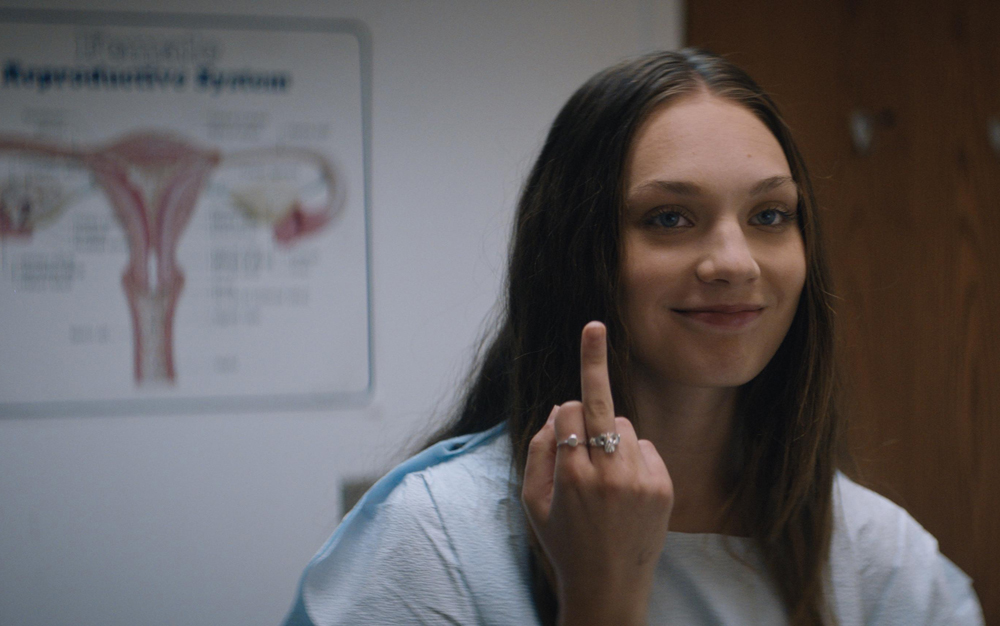You can’t be prepared for the kind of diagnosis that befalls Lindy (Maddie Ziegler) at 16 in “Bloody Hell,” but if anyone was, it would be her – a track star who’s asked onto the Varsity squad to run the 100 meters even though her friend Phoebe (Djouliet Amara) has seniority on her and boasting a supportive mother (Emily Hampshire) who went through her own medical ordeal with breast cancer and lives to tell about it. Nonetheless, the room appears to warp around her as if the rug of her entire reality was pulled from under her upon learning from her doctor that she has MRKH Syndrome, a rare malady in which much of her reproductive system is essentially nonfunctional or as it’s put colloquially, “a blind vagina” that is going to prevent her from having children later in life without some kind of surgery and is a source of deep discomfort now when most of her peers are starting to have their periods.
If one didn’t know this was personal for writer/director Molly McGlynn before walking into her sensational second feature, they would from the intimacy with which she expresses how Lindy processes such devastating news at an early age, full of strange, striking details that only make sense when they emerge from such an experience and the hard-won sense of humor that was no doubt leaned on to pull through. Even Lindy can’t help but laugh when she’s presented with a set of candy-colored instruments intended to dilate her vagina by a nurse who believes she can fold it into her exercise regiment for the track, and it isn’t long before she comes up with an equally absurd yet entirely reasonable counter to ditch the medical-grade dildos when they don’t seem to be working and start have sex to loosen up, a physically and emotionally wrenching process that only serves to put her mind in a vice grip of constant anxiety.
Although Lindy starts to be accused by others that she’s too in her own head to pay attention to anyone else’s problems, McGlynn is marvelously aware of how conscious the teen is of the people around her, unable to directly run her thoughts past the people she’s closest with out of a feeling of shame but taking in their influence as she contemplates her own body, looking towards her mother who hasn’t quite felt womanly since having to sacrifice one of her breasts and intrigued by Jax (Ki Griffin), a confident intersex classmate who hasn’t let their condition define them. The intensity of the experience is conveyed in part by the bold color palette where the frenzy inside Lindy’s brain would appear to manifest itself in her bedroom where each corner is lit with a different fluorescent, but the idea of pressure comes across just as impressively in far more subtle ways when generally ordinary interactions or teenage rites of passage have some unusual wrinkle where Lindy makes sense of things in a different way than most, leading to fraught outcomes where the parties involved have contrary understandings of what happened and adds to her alienation.
McGlynn achieved something similar in her debut “Mary Goes Round,” in which Aya Cash made the most of the juicy part of an addiction counselor nursing a drinking habit that only gets worse upon her return to a dysfunctional home, and having a similarly strong anchor in Ziegler, the filmmaker shows an extraordinary facility for expressing the self-justifications that skew reality when no other guidance seems available. Whereas the characters may fear having a unique outlook on the world as a result of things out of their control, McGlynn finds strength in it with “Bloody Hell” serving as the most convincing evidence to date of an exciting filmmaker with a distinctive vision all her own.
“Bloody Hell” will screen at SXSW on March 14th at 9:30 pm at the Rollins Theatre at the Long Center and March 16th at 11:15 am at the Stateside Theatre.




